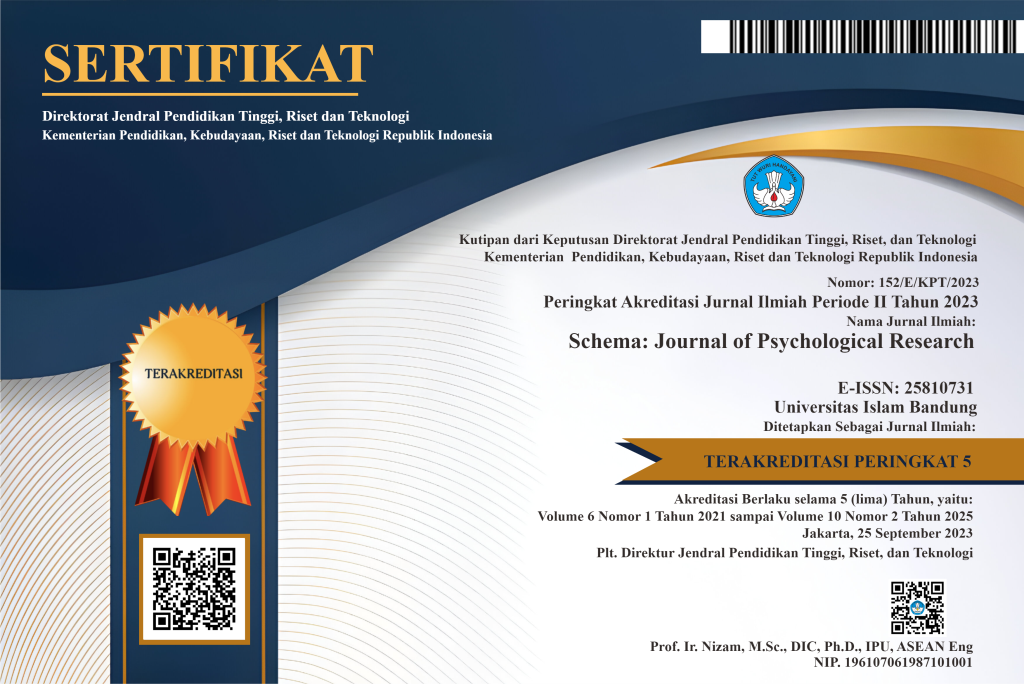Rancangan Intervensi Berbasis Positive Psychotherapy untuk Menanggulangi Penurunan Harga Diri Pasien Perempuan Acne Vulgaris
Abstract
Bagi perempuan bila menderita acne vulgaris pada wajahnya merupakan suatu permasalahan yang sangat mengganggu. Dampak negatif yang paling umum dirasakan akibat menderita acne vulgaris adalah penurunan harga diri. Ketika harga diri rendah ketahanan dan fleksibilitas dalam menghadapi masalah menjadi berkurang. Menanggulangi dampak negatif dari acne vulgaris pada harga diri perlu dirancang suatu intervensi diantaranya berbasis positive psychotherapy. Melalui positive psychotherapy tidak hanya memperbaiki suatu permasalahan namun juga mengembangkan potensi secara optimal untuk menghadapi permasalahan kedepannya. Penelitian ini bertujuan untuk memperoleh gambaran harga diri perempuan yang menderita acne vulgaris dan merancang intervensi berbasis positive psychotherapy untuk menanggulangi harga diri tersebut. Penelitian ini menggunakan pendekatan kuantitatif dan kualitatif; dengan pengambilan sampel secara purposive. Pengumpulan data menggunakan skala harga diri. Hasil pengukuran diperoleh sebanyak 40% dari 35 perempuan memiliki derajat harga diri rendah dan sisanya 60% perempuan memiliki derajat harga diri sedang. Rendahnya harga diri pada perempuan yang menderita acne vulgaris disebabkan oleh derajat self-efficacy yang sedang sebanyak 71,43% dan derajat self-respect yang rendah sebanyak 42,86%. Intervensi positive psychotherapy dirancang sedemikian rupa disesuaikan dengan analisis kondisi harga diri pada perempuan penderita acne vulgaris kedalam 8 sesi terapi.
Key Words : harga diri, positive psychotherapy, acne vulgaris
Full Text:
PDFReferences
Andri, A., Kusumawardhani, AAA., & Sudharmono, A. (2010). Perasaan self-consciousness
dan rendahnya harga diri dan hubungannya dengan kualitas hidup pasien akne vulgaris, Majalah Kedokteran Indonesia, Volume: 60.
Aulia. R. (2018). Efektivitas Positive Psychotherapy untuk Meningkatkan Harga Diri Pasien
Acne Vulgaris. Bandung: Tesis Pascasarjana Universitas Islam Bandung.
Branden, N. (2011). The six pillars of self-esteem. New York: Bantam.
Do, J. E., Cho, S. M., In, S. L, et al. (2009). Psychosocial aspects of acne vulgaris: a
community-based study with Korean adolescents. Journal Annals of Dermatology, Vol.24
Frith, K. T. (2014). Globalizing Beauty: A Cultural History of the Global Beauty Industry.The Journals of ICA Annual Conference.
Gelles, R. (2011). Fair and Lovely: Standards of Beauty, Globalization, and the Modern Indian Woman, Independent Study Project (ISP) Collection 1145.
Helgeson, V. S., & Fritz. H. L. (1999). Cognitve adaptation as a predictor of new coronary events after percutaneous transluminal coronary angioplasty, Psychosomatic Medicine, 6]. Hosthota, A., Bondade, S., dan Basavaraja, V. 2016. Impact of Acne Vulgaris on Quality of Life and Self-esteem, Journal of Cutis, Vol. 98.
Lasek, R. J., & Chren, M-M. (1998). Acne vulgaris and the quality of life of adult dermatology patients. Journal of Archives of Dermatololgy, Vol. 134.
Mruk, C.J. (2006). Self-esteem research, theory, and practice: Toward a positive psychology of self-esteem (3 ed,). New York: Springer.
Magyar-Moe, J.L. (2009). Therapist's guide to positive psychological interventions. United States of America: Elsevier.
Primisawitri, P. P. (2015). Epidemiology of acne. Surakarta: PERDOSKI.
Peterson, C. & Seligman, M. E. P. (2004). Character strengths and virtues; a handbook and classification. New York: Oxford-American Psychological Association.
Rashid, T. (2015). Positive psychotherapy: A strength-based approach. The Journals of Positive Psychology, Vol.10, No.1.
Robinson, T. L., & Ward, J. V. (1995). African American adolescents and skin color. Journal of Black Psychology, 21(3).
Seligman, M.E.P., Rashid, T., & Parks, A.C. (2006). Positive psychotherapy. Article American Psychological Association.
Vilar, G. N., & Filho, J. F. 8. (2015). Quality of life, self-esteem and psychosocial factors in adolescents with acne vulgaris. Journal of Anais Brasileiros de Dermatologia, Vol, 90.
Walker, C. & Papadopoulos, L. (2005). Psychodermatology: The psychological impact of
skin disorder. Cambrige: Cambridge University.
DOI: https://doi.org/10.29313/schema.v0i0.4597
Refbacks
- There are currently no refbacks.
Indexed by:
This work is licensed under a Creative Commons Attribution-NonCommercial-ShareAlike 4.0 International License.












